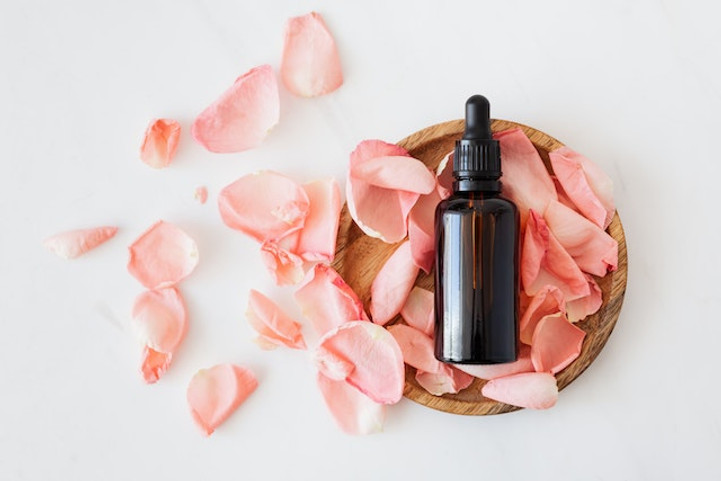Posted by Julie Carter on Oct 13, 2023
Nighttime Nectar: Aromatherapy’s Sweet Shortcut to Better Sleep
Are you tired of tossing and turning, counting sheep, or battling insomnia? Well, there's a natural fragrant solution that might just help you drift into dreamland faster than you can say "lavender." Enter the world of aromatherapy, where the power of scent can work wonders for your sleep quality. In this post, we'll explore how aromatherapy works, which scents can help you sleep better, and how to use essential oils effectively.
Does Aromatherapy Really Work?
So, here’s the million-dollar question – can simply smelling a fragrance have a profound influence on your brain, body, and behavior? More and more aromatherapy research is pointing to a resounding “yes.” Essential oils are made up of volatile organic compounds and aromatic components. When you breathe in a fragrance, it’s not just a pleasant sensation; it kicks off a chemical reaction in your brain that can affect memory, thoughts, and emotions.
Furthermore, fragrant compounds can actually cross the blood-brain barrier, interacting with receptors in the central nervous system. Aromatherapy has shown remarkable potential in improving sleep by acting on the hypothalamus, pituitary gland, olfactory nerves, and autonomic nervous system. The best part? It's applicable to a wide range of individuals, including those with sleep disorders and healthy sleepers. Inhaling aromatherapy seems to be particularly effective in improving sleep disorders, making it a promising ally in the quest for better rest.
Scent-sational Slumber: Which Scents Promote Sleep and Why?
Now that we've unlocked the science behind aromatherapy let's explore some of the best scents to help you snooze more soundly:
- Lavender: Ah, the sweet smell of lavender. It's like a lullaby for your nose. Lavender has been a sleep-time favorite for centuries, and science confirms its calming effects. Research shows that lavender essential oil can reduce anxiety, lower heart rate, and improve sleep quality. Its soothing aroma helps relax your mind and body, making it easier to fall asleep and stay asleep.
- Chamomile: Chamomile tea isn't the only sleep-inducing chamomile product out there. Chamomile essential oil contains compounds that may reduce insomnia symptoms and improve overall sleep quality. It's gentle and safe for all ages, making it a perfect choice for a bedtime aromatherapy routine.
- Valerian: While valerian doesn't smell like a bed of roses (it's quite pungent), its root extracts have been used for centuries as a natural remedy for sleep disorders. Some research suggests that valerian may increase the production of a neurotransmitter called GABA, which helps calm the nervous system and promote sleep.
- Bergamot: This citrusy scent is like a breath of fresh air for your sleep routine. Bergamot essential oil can help reduce stress and anxiety, making it easier to relax and unwind before bedtime. It's especially useful if racing thoughts are keeping you awake.
- Cedarwood: Imagine a rich, woodsy aroma with the ability to induce a sense of relaxation and tranquility. Breathing in this earthy scent can stimulate the brain to release serotonin, a precursor to melatonin. It can help alleviate stress and anxiety due to its mild sedative effect. This sense of physical and mental calm helps reduce the time it takes to fall asleep, promising you a peaceful night’s rest.
Aromatherapy 101: How to Use Aromatherapy for Better Sleep
Now that you know which scents to reach for, let's explore how to incorporate aromatherapy into your nightly routine:
1. Diffusers: A diffuser is your aromatic ally. Simply add a few drops of your chosen essential oil(s) and let it disperse throughout your room. It's a passive way to enjoy the soothing aroma all night long.
2. Pillow Sprays: Create a DIY pillow spray by mixing a few drops of your favorite essential oil with water in a spray bottle. Give your pillow a gentle spritz before bedtime for a calming scent that lulls you to sleep.
3. Bath Time Ritual: Add a few drops of essential oil to your evening bath for a relaxing soak. The warm water and soothing scent create a tranquil environment that preps your body for sleep.
4. Massage: Consider a gentle massage with diluted essential oils. Mix a few drops with a carrier oil like coconut or almond oil and massage your neck, shoulders, and temples. The act of massaging itself promotes relaxation, while the aroma enhances the experience.
A Word of Caution: Scents to Avoid
Not all scents are created equal when it comes to sleep. Before bedtime, steer clear of stimulating and invigorating scents like peppermint, eucalyptus, and rosemary. These fragrances can be energizing and counterproductive to your quest for a peaceful slumber.
Aromatherapy can be a delightful and effective tool in your sleep-improvement arsenal. However, it’s crucial to remember the fundamentals of good sleep: establish a serene sleep environment and good sleep hygiene, discover the optimal sleep position for you, and invest in quality bedding essentials. Plush mattress pads, cozy comforters, and supportive hotel pillows set the stage for a relaxing sleep environment where you can fully enjoy the benefits of aromatherapy and peacefully drift off. By sticking to these sleep tips and incorporating essential oils into your bedtime routine, you’re well on your way to sweet dreams and better sleep.
Photo by Karolina Grabowska

